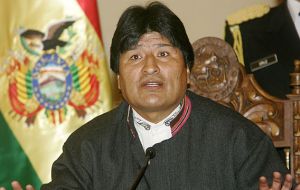MercoPress. South Atlantic News Agency
Morales: “eliminate capitalism” to save planet and mankind
 Bolivia's first indigenous president Morales
Bolivia's first indigenous president Morales Bolivian President Evo Morales has called for an end to capitalism as part of a series of radical measures “to save the planet and mankind”.
"If we really want to save the planet, we must eliminate the capitalist system" Bolivia's first indigenous president told delegates from around the world at the United Nations in New York. Mr Morales argued that the capitalist system was mainly responsible for climate change and for the "accumulation of waste". He also railed against the development of bio-fuels which he said only serve to fuel "poverty and hunger" and he instead expressed strong support for clean energies. "Biofuels are very harmful, in particular for the poor people of the world" he underlined. Morales called for "respect of Mother Earth," guaranteeing access to basic services for all and putting and end to consumerism. In a side swipe at Brazil, major manufacturers of the bio-fuel ethanol, he said some presidents were putting cars ahead of people. "Mother Earth is not a commodity. It's not something to buy and sell," he said. Morales proposed an international convention "to protect water resources and prevent their privatization by a few." The Bolivian president also called for the UN system, particularly the powerful Security Council, to be "democratized" so that power was not monopolized by a few nations. More than 2,500 indigenous delegates are taking part in a two-week session, the first since the UN General Assembly adopted a non-binding declaration last September upholding the human, land and resources rights of the world's 370 million indigenous people. In a message to the indigenous forum, UN chief Ban Ki-moon, who is currently on an African tour, welcomed the choice of climate change as the special theme of the historic session. "As custodians of these lands, they [indigenous peoples] have accumulated deep, first-hand knowledge about the impacts of environmental degradation, include climate change", he said. "They know the economic and social consequences, and they can and should play a role in the global response".




Top Comments
Disclaimer & comment rulesCommenting for this story is now closed.
If you have a Facebook account, become a fan and comment on our Facebook Page!